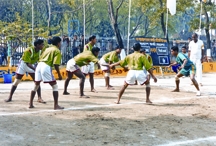Kabadi
Kabadi recognised as the national game of Bangladesh, it is played by two teams of 12 players each on a 12.50 metre by 10 metre rectangular court in which a player, while holding his breath, dashes into the opponent team's area, touches some player(s) and/or wrestles out to come back home safely without releasing his breath and thereby scores point for his team. The team consists of 12 players but only seven play in the court and the rest stay out of court as extras. While intruding into the opponents' area the player clearly and audibly repeats the word 'kabadi' without break and without releasing the breath. This is called cant or 'dak' (note).

The time for the match comprises two halves of 20 minutes each and 5 minutes break in between. A team earns one point by throwing out each one player of the opposite side. Two extra points are added as bonus when all players of the opponent party are out. The team that earns the greater number of points in the stipulated time wins the game.
Kabadi is a very popular game in Bangladesh, especially in the villages and, for that, it is also called the 'game of rural Bengal'. In some areas kabadi is also known as ha-du-du. But despite its popularity ha-du-du had no definite rules and it used to be played with different rules in different areas. Ha-du-du was given the name kabadi and the status of National Game in 1972.
Bangladesh Amateur Kabadi Federation was formed in 1973. It framed rules and regulations for the game. Bangladesh first played kabadi test in 1974 with a visiting Indian team, which played test matches with the district teams of Dhaka, Tangail, Dinajpur, Jessore, Faridpur and Comilla. In 1978, the Asian Amateur Kabadi Federation was formed at a conference of delegates from Bangladesh, India, Nepal and Pakistan in the Indian town of Villai.
In 1979, a return test between Bangladesh and India was held at different places of India including Bombay, Hyderabad, and Punjab. The Asian Kabadi Championship was successfully arranged in 1980 and India emerged as the champion and Bangladesh as the runners-up. Bangladesh became runners-up again in 1985 in Asian Kabadi Championship held in Jaipur, India. The other teams included in the tournament were Nepal, Malaysia and Japan. Kabadi was included for the first time in Asian Games held in Beijing in 1990. Bangladesh took part in it and won silver medal. But Bangladesh won bronze medal in the Asian Games held in 2006 and 2010.
The tournaments arranged by Bangladesh Kabadi Federation include National Kabadi Competition, National Youth Kabadi Competition, Premier Kabadi, First Division Kabadi League, Second Division Kabadi League, Independence Day Kabadi Competition, Victory Day Kabadi Competition, Baishakhi Kabadi Fair, Boys' Kabadi Competition and School Kabadi Competition. Teams of different services (Bangladesh Rifles, Police, Fire Service and the Army), clubs, and corporations play kabadi in Bangladesh. Major local clubs that play kabadi include Dilkusha Sporting Club, Dhaka Wanderer's Club, Brothers' Union, Maniknagar Kabadi Club and Bangladesh Bank Club. [Gofran Faroqi]
